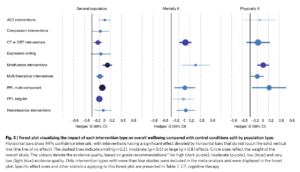What psychological interventions work to improve mental wellbeing?
Having ‘positive’ states of mental health, or high mental wellbeing, is an important outcome for an individual’s overall health and wellbeing – it can act as a protective factor against illness and can aid in physical and mental disease recovery.
There are various approaches that can be used to significantly improve subjective states of wellbeing within individuals. One type are so-called psychological approaches, defined as “activities or groups of activities aimed to change behaviours, feelings and emotional states”. Similar to how a particular health problem (e.g cancer) can be addressed using different medical strategies (radiotherapy, chemotherapy etc), there are different psychological interventions that can be used to address mental wellbeing.
We wanted practitioners and other professionals to be able to develop a better understanding of which psychological interventions have an impact.
Our paper in Nature Human Behaviour examined the efficacy of distinct types of psychological interventions, and the impact of various moderators, in a unified systematic review and meta-analysis. We looked at more than 23,000 abstracts and over 2,000 articles to find a total of 419 randomised controlled trials from clinical and non-clinical populations (n=53,288) that could be included.
Effective mental health interventions
We found that a number of different types of interventions were effective in improving outcomes of wellbeing:
- If you plan on developing an intervention that works across clinical populations and the general population, the evidence currently only supports mindfulness-based interventions and interventions based on positive psychology.
- If you are specifically planning to roll out interventions in the general population, there is sufficient evidence that interventions based on Acceptance and Commitment Therapy (ACT), interventions focused on building compassion (for others and self), those that focus on reminiscence, and interventions that combine different paradigms also have impact.
- If you work in populations with mental illness, there is also sufficient evidence for Cognitive Behavioural Interventions and reminiscence interventions.
- The evidence for interventions other than positive psychology or mindfulness in physical illness is in its current state not mature enough.
- Generally, evidence was stronger for programs that are provided over a longer period of time. You can also use different formats, with group-based, individual face-to-face and online formats all being supported. It is important to stay at it though as on average the effect drops off after 3 months.

Improving the evidence
Overall, the review very clearly found that you can build wellbeing reliably, but that it matters what approach you consider. We don’t need more evidence on whether these interventions work for wellbeing outcomes, but what the field needs to move towards is determining what their impact is on other key metrics (for example health or economic outcomes) and determining which interventions work better, and for whom. We need the field to move a step closer towards precision wellbeing science.
Conducting this review was a big feat and involved going through a rather eclectic state of scientific literature. While there is a need to reduce ambiguity regarding measurement tools and the definitions that are used for mental wellbeing, the review shows clear ways forward in the use of psychological interventions to build individual mental wellbeing.
We would like to do an evidence review of interventions using the WEMWBS measure
Are you interested in supporting us?
